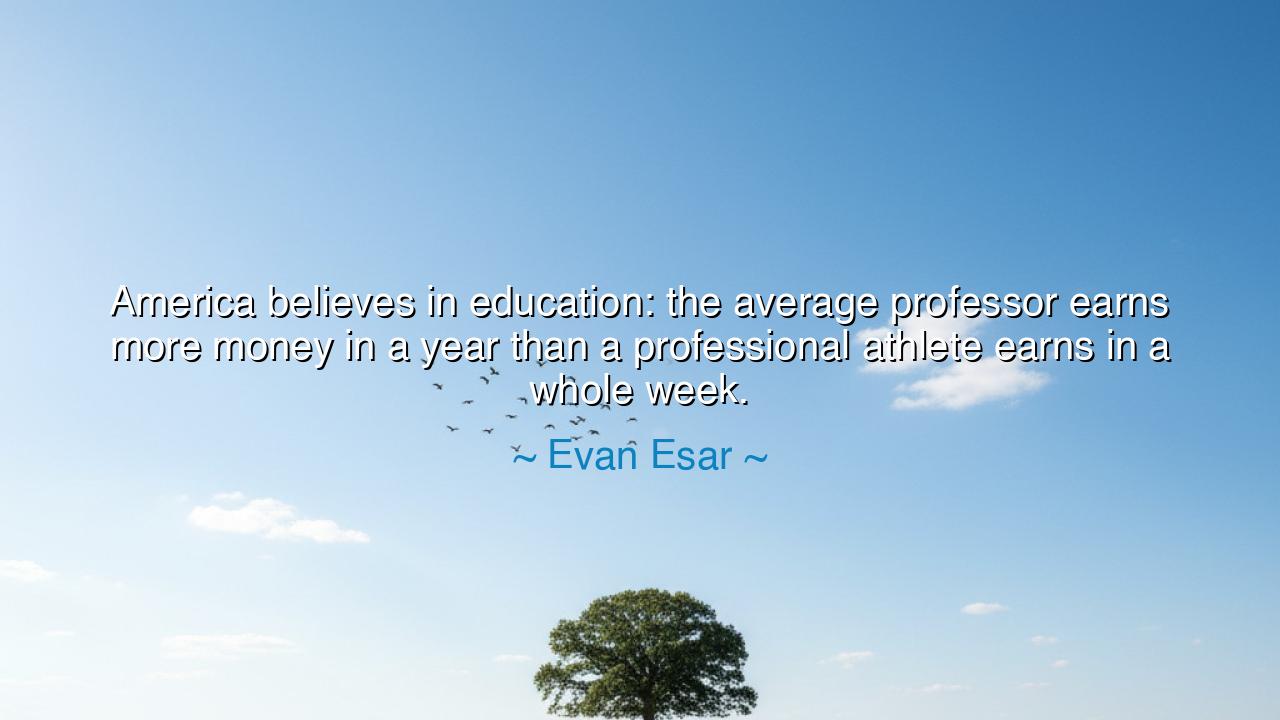
America believes in education: the average professor earns more
America believes in education: the average professor earns more money in a year than a professional athlete earns in a whole week.






Hear the sharp wit of Evan Esar, who declared with irony: “America believes in education: the average professor earns more money in a year than a professional athlete earns in a whole week.” In these words lies both humor and rebuke, for beneath the jest is revealed a painful truth about the values of a nation—that the guardians of wisdom are prized less than the entertainers of crowds.
The professor, keeper of knowledge and shaper of minds, devotes years to study, sacrifice, and service. From his labor springs invention, discovery, and the cultivation of future generations. He carries the torch of education, ensuring that the flame of wisdom is never extinguished. Yet his reward is meager, stretched thin across the span of a year, while the world often passes him by in silence.
The athlete, by contrast, is elevated like a hero of old. His speed, strength, and spectacle draw multitudes, and in the roaring of the arena he gathers wealth in torrents. In a single week, he may receive what the professor earns in a whole year. Esar’s irony pierces here—if America truly “believes” in education, why is the teacher poor while the athlete prospers?
This is no attack upon the athlete, for his skill, too, is a gift, and the ancients themselves honored the games. Yet the wisdom of the saying lies in proportion: a society reveals its soul by what it rewards. If knowledge is cherished, the teacher should stand honored; if entertainment rules, then the crowd will shout for the athlete and forget the scholar.
Thus let this teaching be remembered: honor those who guard the mind as much as those who strengthen the body. For when the roar of the stadium fades, it is the professor’s wisdom that endures, shaping leaders, guiding nations, and lifting mankind higher. Esar, with humor as his weapon, speaks a truth that should awaken generations: a people who prize spectacle above wisdom risk building their future upon sand.






HTYen Hoang Thi
Esar’s quote really makes me question the financial priorities of modern society. It’s true that athletes can earn more in one week than some professors do in an entire year, but should this really be the case? Why are the values of entertainment and fame rewarded so highly compared to professions that contribute more to intellectual and societal growth? How does this imbalance shape young people's ambitions and career choices?
PHPhu Hong
Evan Esar’s quote might be humorous, but it highlights a serious issue about income inequality. Why are those who educate and inspire future generations often paid so little compared to athletes who entertain for a living? It’s a strange contrast, and it makes me think—shouldn’t society prioritize the work that builds knowledge and fosters growth over entertainment? How does this financial imbalance affect the quality of education?
DDNgoc Diep va Ngoc Diem Do
This quote raises an important question about society’s values. Why do we reward professional athletes with astronomical salaries while professors, who shape minds and influence generations, earn far less? Is this a reflection of the importance we place on entertainment versus education? How can we shift the focus to better appreciate those in academia? What impact does this financial disparity have on the future of education?
GDGold D.dragon
Evan Esar’s quote brings attention to the disparity between the education sector and professional sports in terms of earnings. It’s interesting how society often values athletes more than educators, despite the fact that education shapes the future. Shouldn't we place more value on professions that directly contribute to the development of society? Why do athletes receive such immense salaries, while teachers and professors are often underpaid in comparison?